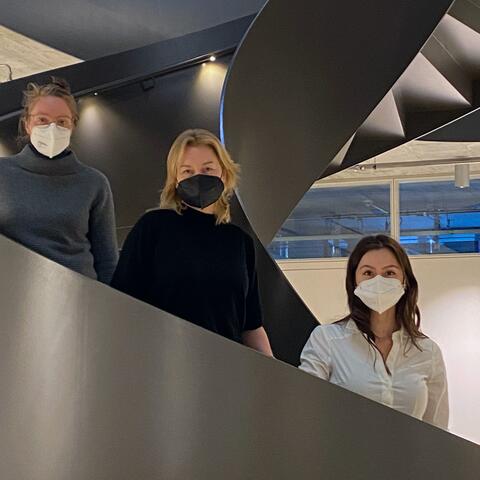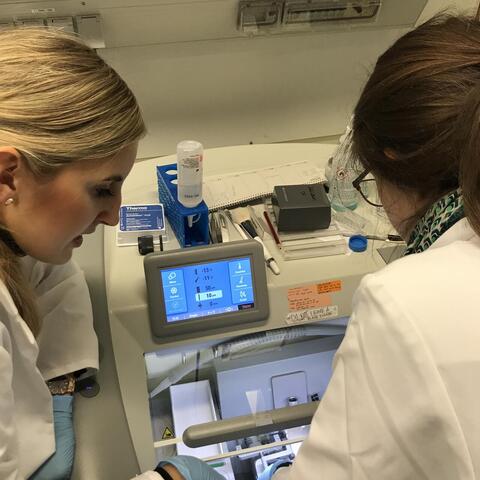Teaching the teachers
The MDC’s further education program Lab Meets Teacher gets good grades across the board from participants. In the 2019/2020 school year, the course received an average rating of “Excellent” from participating teachers, most of whom teach high school level biology and chemistry, with 92 percent saying they would recommend it to others. In addition to the training days, the program provides teaching materials in the form of films, lectures, exercises and concept posters, which can be downloaded from the MDC website.
The format was developed by Dr. Luiza Bengtsson, who is in charge of the project as scientific director, while Zoe Ingram coordinates and oversees the courses. The team also includes student assistant Micela Condor Jonske.
When was Lab Meets Teacher launched and why?
It is part of MDC’s philosophy to be an institution that makes its research transparent, understandable and useful for society – because that’s what knowledge transfer is all about.
Luiza Bengtsson: The MDC has been involved in student outreach efforts for nearly 20 years. On the Berlin-Buch campus, we collaborate with a variety of partners in the Life Science Learning Lab (Gläsernes Labor), where students and young people can perform experiments and conduct research. In 2011, I started working in the Communications Department with the task of developing an additional training concept for teachers. The result was the Lab Meets Teacher program, which we launched in 2012. It is part of MDC’s philosophy to be an institution that makes its research transparent, understandable and useful for society – because that’s what knowledge transfer is all about. The entire Helmholtz Association, which includes the MDC, is committed to this goal.
How do you choose the topics and participating scientists?
Luiza Bengtsson: We scout out which of the MDC’s research topics align well with the overall curricula. After all, the teachers should be able to use what they learn here in their lessons. Then we approach the research groups and ask them if they would like to participate. The nice thing is that the scientists always say yes. Sometimes, entire groups will dedicate a whole day to visiting teachers.
What do the scientists get out of it?
Zoe Ingram: These courses are a really good way for researchers to share their work with the public. After all, scientific communication is part of their job. They also enjoy it. Teachers make for a very interested, engaged and appreciative audience. I would say that both sides get a great deal out of these courses.
Has the pandemic put knowledge transfer on hold?
Luiza Bengtsson: No, but it has changed the format a lot. The Lab Meets Teacher program usually involves day-long, in-person events, with teachers visiting the scientists in their labs and working alongside them. We would typically organize about eight of these events a year. As of September 2020, we now offer monthly virtual Lab Meets Teacher events, which involve MDC scientists giving a 90-minute lecture on a particular topic.
The Lab meets Teacher team: Zoe Ingram, Luiza Bengtsson and Micela Condor Jonske.
What do the teachers think of these online lectures?
Zoe Ingram: They really like them. We often get feedback saying: “This is great, keep it up.” Unlike the training days in the lab, the online events have the advantage of being open to teachers from further afield or even abroad. We’re obviously really happy about that.
Luiza Bengtsson: The majority of participants that attend the in-person events come from Berlin and Brandenburg. The program is officially recognized by the Berlin Senate Department for Education, Youth and Family and the Brandenburg Ministry of Education as continuing education. This means that teachers can participate during working hours. But we have also welcomed teachers from Lower Saxony and Bavaria to our labs.
How many teachers participate in each event?
Luiza Bengtsson: We had 25 participants attend our very first lab event. But that was a bit too good of a turnout – after all, scientists are still working in these laboratories. Even the visitors found the group too big. We have learned from experience that a good number is eight. The online events have been attended by anywhere from 15 to 75 participants – there is no upper limit.
Will you continue to offer virtual courses in addition to the lab visits after the pandemic, if the demand is there?
Zoe Ingram: That’s our plan. The two formats are very different in what they deliver. The online lectures provide 90 minutes of condensed knowledge. They still generate interest and enthusiasm among the teachers, but the face-to-face courses in the lab offer more first-hand insights into daily research. Many participants leave at the end of the day saying the experience has reminded them why they chose to study chemistry or biology in the first place.
The teachers experience everyday laboratory life up close - here making cryosections, wafer-thin sections of frozen tissue.
Luiza, you previously worked as a scientist. What inspired you to change to communication?
Luiza Bengtsson: I studied chemistry, Eastern and Central European studies and gender studies at Lund University in Sweden, did my PhD in biochemistry at Freie Universität (FU) Berlin and then spent several years conducting research at the Johns Hopkins University School of Medicine in the United States. I returned to the FU as a postdoc. Then, in 2007, I joined Thomas Jentsch’s research group at the MDC. I really enjoyed my work as a scientist. But what I enjoyed even more was communicating scientific research to others. Even during my doctorate, I did a lot of teaching. My hand was the first to go up whenever someone was needed to organize a lab tour, give a popular science lecture or mentor students. The switch to scientific communication was the logical next step for me.
Do you miss scientific work?
Luiza Bengtsson: I never stopped. Designing good training courses requires a deep involvement with the scientific topic, the methods, and the experiences of the teachers and participating scientists. For the best results, you need to take a scientific approach. In addition, developing the Lab Meets Teacher program has brought me closer to my interdisciplinary roots and the world of public engagement. For example, I am currently experimenting with different forms of dialogue between science and society as part of a European open science project, and am collaborating on a white paper on citizen science in Germany.
It is important that the teachers retain this wonder, this enthusiasm, this curiosity, and pass it on to their students; that they encourage them to study something in that field if it interests them.
What about you, Zoe? How did you come to the MDC?
Zoe Ingram: I studied educational sciences with a focus on adult education at Humboldt-Universität zu Berlin. I met Luiza at a seminar. She was looking for a partner to help evaluate the Lab Meets Teacher program, and I was immediately on board. Then I did my internship here and returned to the MDC again during my master’s studies to work on the ORION open science project. This was also where I wrote my master’s thesis.
What do you most enjoy about your work here?
Zoe Ingram: The teachers are often very enthusiastic. And I am too! I was once lucky enough to participate in a workshop where we magnified the cross-section of a nerve – which is finer than a hair – under an electron microscope. I was completely blown away to see just how much information is contained in something so tiny. And I wasn’t the only one – the teachers had the same reaction. It is important that they retain this wonder, this enthusiasm, this curiosity, and pass it on to their students; that they encourage them to study something in that field if it interests them. I grew up in Hawaii and I don’t think my biology teacher had ever set foot in a laboratory. My idea of biology was limited to a few marine animals. It was never about how knowledge is created. In the Lab Meets Teacher program, teachers have the unique opportunity to become part of a research group, to see and experience day-to-day research. They will surely pass this experience onto their students.
Jana Ehrhardt-Joswig conducted the interview.
- Feedback on the Lab Meets Teacher program
-
-
Excellent lecture and host. Thank you for the effort and the opportunity to keep learning.
I am very happy that this course is also available in digital format, as it allows me to participate from Switzerland. Thank you very much, I learned a lot!
For those from Hamburg and the rest of Germany, it would be great if these virtual events could continue once the epidemic is over!
Further information
- Lab Meets Teacher
- Background information on Lab Meets Teacher (only in German)






